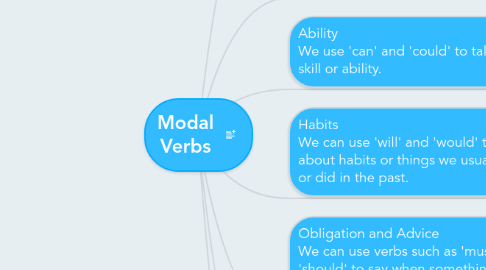Modal Verbs
by daniel perez

1. We use modal verbs to show if we believe something is certain, probable or possible (or not). We also use modals to do things like talking about ability, asking permission making requests and offers, and so on.
1.1. Modals are different from normal verbs: 1: They don't use an 's' for the third person singular. 2: They make questions by inversion ('she can go' becomes 'can she go?'). 3: They are followed directly by the infinitive of another verb (without 'to').
2. Probability: First, they can be used when we want to say how sure we are that something happened / is happening / will happen. We often call these 'modals of deduction' or 'speculation' or 'certainty' or 'probability'.
2.1. For example: • It's snowing, so it must be very cold outside. • I don't know where John is. He could have missed the train. • This bill can't be right. £200 for two cups of coffee!
3. Ability We use 'can' and 'could' to talk about a skill or ability.
3.1. For example: • She can speak six languages. • My grandfather could play golf very well. • I can't drive.
4. Habits We can use 'will' and 'would' to talk about habits or things we usually do, or did in the past.
4.1. For example: • When I lived in Italy, we would often eat in the restaurant next to my flat. • John will always be late!
5. Obligation and Advice We can use verbs such as 'must' or 'should' to say when something is necessary or unnecessary, or to give advice.
5.1. For example: • Children must do their homework. • We have to wear a uniform at work. • You should stop smoking.
6. Permission We can use verbs such as 'can', 'could' and 'may' to ask for and give permission. We also use modal verbs to say something is not allowed.
6.1. For example: • Could I leave early today, please? • You may not use the car tonight. • Can we swim in the lake?
7. Past modals These past modal verbs (Could have, should have, would have) are all used hypothetically, to talk about things that didn't really happen in the past.
7.1. Could have + past participle means that something was possible in the past, or you had the ability to do something in the past, but that you didn't do it. (See also modals of ability.) • I could have stayed up late, but I decided to go to bed early. • They could have won the race, but they didn't try hard enough. • Julie could have bought the book, but she borrowed it from the library instead. • He could have studied harder, but he was too lazy and that's why he failed the exam.
7.2. Couldn't have + past participle means that something wasn't possible in the past, even if you had wanted to do it. • I couldn't have arrived any earlier. There was a terrible traffic jam (it was impossible for me to have arrived any earlier). • He couldn't have passed the exam, even if he had studied harder. It's a really, really difficult exam.


